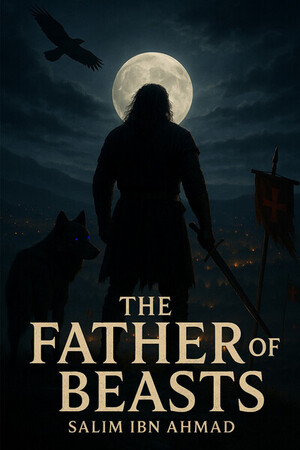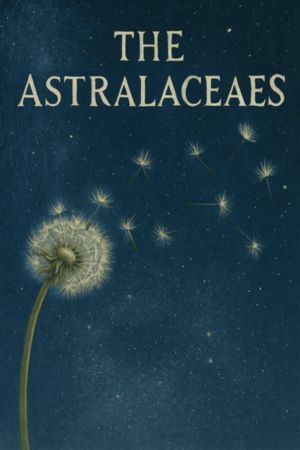Chapter 3:
Chapter 2 — The Crush
The Father of Beasts
The tower leaned against the wall like a giant pushing with its shoulder. Hooks bit into stone. Wet hides rasped against the merlons. Ladders scraped and clawed until their claws caught.
Ahmad had no arrows left.
He let the bow hang at his side and gripped his short spear. Around him, townsmen stacked stones knee-high, an axe-head tied to a broom handle, pots of water set where oil should have been. Smoke thickened the air until every breath burned.
“Hold!” someone shouted. The word belonged to all of them now.
The first Frank hauled himself over the lip of the parapet, hook in hand. Ahmad stepped forward, caught the shaft under his arm, twisted, and hurled the man down between tower and wall. Another climbed up from a ladder. Ahmad drove the spear under his shield, felt ribs give, wrenched the weapon free, and stepped aside. Nahhas slammed into the next man’s knee, teeth tearing. The Frank fell sideways, and the spear meant for Ahmad struck his fellow instead.
Reeh dropped from the smoke. His talons raked across a man’s cheek before he shot back into the sky. The man screamed, clutched his face, and toppled. Others flinched, raising shields against a bird they could not follow.
“Push them off!” the mason cried. For a while, the men near him did. Wood and iron met bodies. The tower spilled men onto the stones. The first wave died under clubs and spears; the second walked on their corpses. Long spears stabbed over shields. Hooks caught belts and wrists and dragged defenders down. Steel went to work where it was strongest—up close.
Ahmad snapped a spear shaft with his forearm and struck back without pause. He saw not faces but targets—an elbow, a groin, a throat turned wrong under a helm. He fought like a hunter when the boar turns, every move meant to end. Around him, townsmen steadied themselves to his rhythm without knowing it. For a time, the wall held.
Then the ram at the lower gate boomed. The stone gave a tired groan, promising to break soon.
The crush thickened. A man in a white tunic with a red cross climbed over the wall and swung his sword down with certainty. Ahmad met it on the spear’s shaft, stepped inside, and smashed his fist into the man’s mouth. Teeth broke. The sword dropped. Ahmad took it without looking at him. He tested its balance once across a shield and set himself.
Voices rose in the enemy’s tongue. A chant spread: “Deus vult!” The cry rolled up ladders and through the tower, harsh and ugly.
“Back!” someone cried. “Back to the stair!” But there was no back. The men who had room to yield did; the rest went down and were trampled. White tunics pressed forward. The smell changed—more blood.
Nahhas vanished into a knot of legs and came out with his muzzle slick. He waited, watching ankles. When a man stumbled, the wolf tore his tendon and left him to the tide.
A stone the size of a man’s head smashed against the wall. The parapet shook under Ahmad’s boots. Another stone hit higher, tearing away a merlon and the walkway under it. Men fell with the stone. The wall line broke and spilled like water from a jar.
Ahmad went with them.
The fall wasn’t far, but it was onto stone. He landed on hip, shoulder, then head. The shock tore the air out of him. The sword slid away, then his hand found it again and locked on as if it were a branch in a river.
Bodies crashed after him. One landed across his ribs, another pinned his arm, another pressed down on his legs. Pain flared, then dulled. He tried to roll but couldn’t. Boots trampled the pile—friend and enemy alike. A shield rim rang against the stone by his head. Screams cut close. A groan went low as steel went in.
Above him, through the gap in the broken parapet, he saw a strip of sky the colour of tarnished copper. The tower loomed through smoke. Faces appeared, vanished, replaced by more. Some voices cried “Christe!” Others shouted nothing, just worked like men in a slaughterhouse.
Nahhas growled close—low, guttural, teeth in flesh—then his sound was swallowed by the noise. Reeh crossed the strip of sky once, a blur against smoke, and vanished.
Ahmad’s mouth filled with blood from the fall and the weight pressing him. He tried to spit but couldn’t turn. The blood slid back into his throat. His chest rattled. Still his hand gripped the sword. He couldn’t lift it, but he would not let it go.
The world shrank to touch: cold stone under his back; a belt buckle grinding into his ribs; the tick of another man’s blood running down his arm; grit under his teeth. The stink changed again—burned pitch, hair, excrement, something sickly sweet.
Far in the city a woman called for a child. Nearer still, a child cried for its mother. The ram hit the gate again. Stone groaned. One more blow would do it.
Ahmad forced his breaths small, like a man under a river counting heartbeats. Boots struck stone near his ear. A spear probed the pile, hit bone, and rang like a stick on a pot.
“Avance!” someone shouted in the enemy tongue. The weight shifted. For a moment Ahmad thought he might be dragged free, but more bodies fell and crushed him flatter. His vision went to sparks, then black, then back again to that strip of sky.
He remembered how these same voices had once promised mercy before knives. Now the mouths shouted prayers as swords cut flesh.
He held the sword like a prayer, even if he could not lift it.
Another part of the parapet gave way. Dust rose. Men on the tower cheered. On the ground, men only groaned. The chant swelled again: “Deus! Christe!”.
His head hammered. The strip of sky turned dark. Smoke filled it. The weight on him pressed like stone.
He tried again to move his arm. Couldn’t. The pommel dug into his palm. He thought of Adham stamping in the gate-tower, Reeh’s shadow falling across men’s eyes, Nahhas with teeth sunk deep. He did not think of anything else.
Above, a white hem stained brown moved in the smoke. A man with a cross stepped where others had fallen. Another in a wool cap looked down, then turned away.
The ram struck again. The gate answered.
The strip of sky narrowed.
He drew what little air he could find and kept it. He passed out, it wasn’t like a blow but slow and certain.
And he did not wake again until night.




Please sign in to leave a comment.